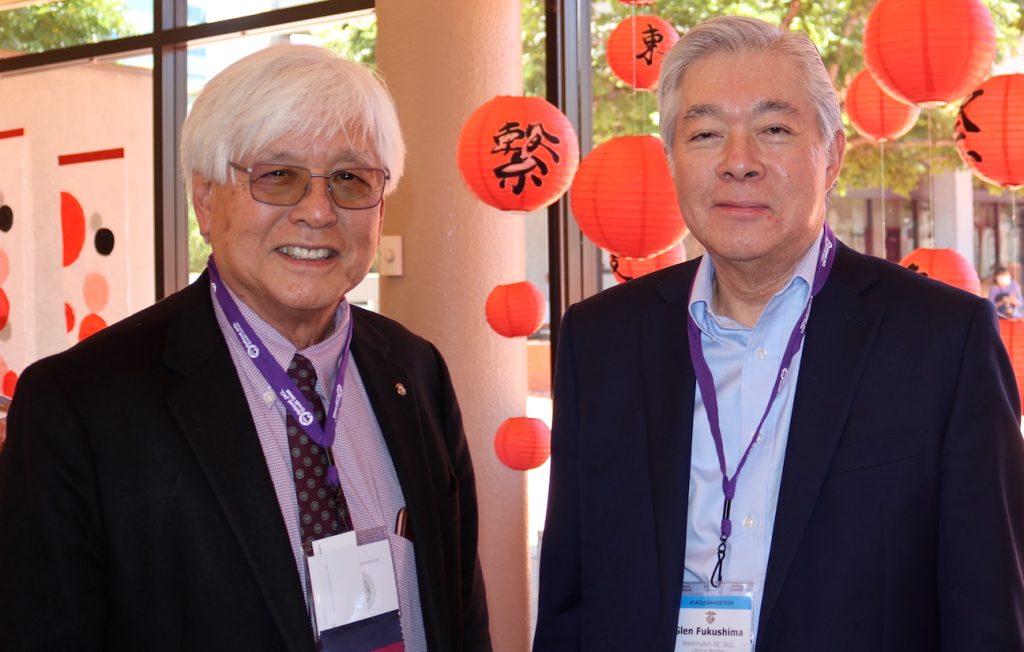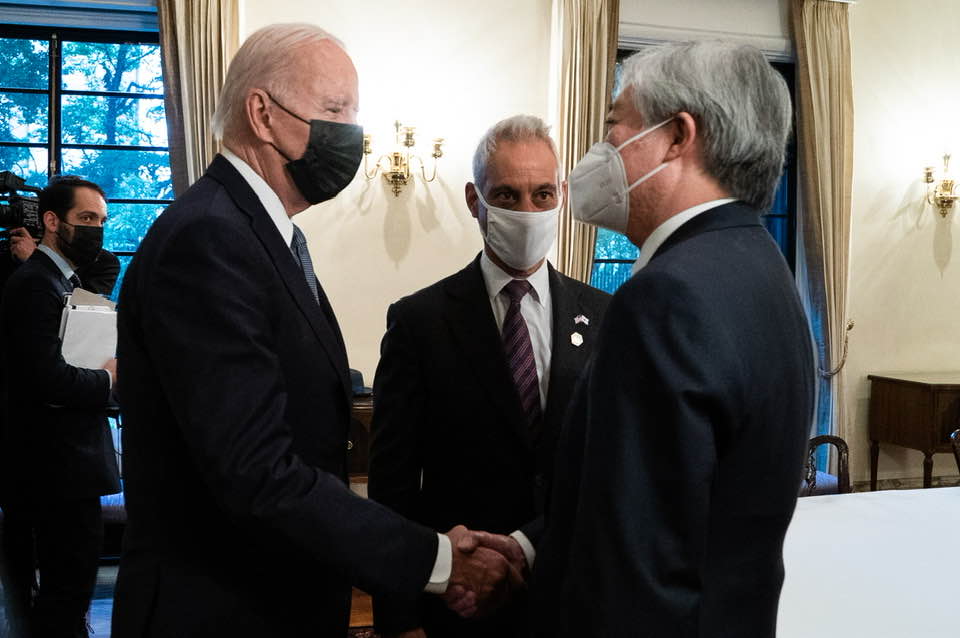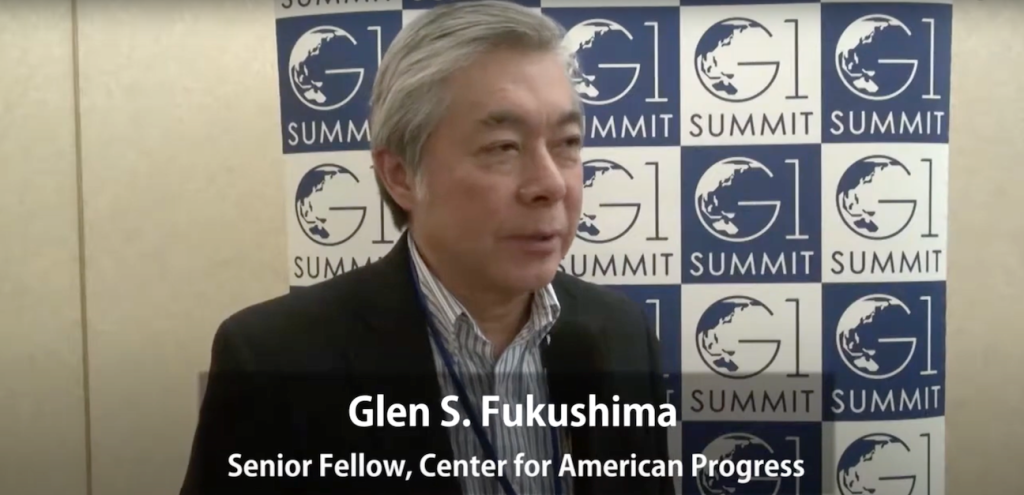
JACL National President Larry Oda and Glen S. Fukushima in the lobby of the Aratani Theater in Los Angeles during the 2023 JACL National Convention. (Photo: George Toshio Johnston)
Businessman-philanthropist emphasizes education via endowments.
By George Toshio Johnston, Senior Editor
Glen S. Fukushima has been making an impact for decades.
Now 75, prior to him currently serving as vice chairman of the Securities Investor Protection Corp. and a senior fellow at the policy institute Center for American Progress, Fukushima’s C-suite level business experience included stints at Airbus Japan, NCR Japan, Cadence Design Systems, Arthur D. Little Japan and AT&T Japan. He also was a two-term president of the American Chamber of Commerce in Japan and after earning his law degree, served as the deputy assistant, U.S. trade representative for Japan and China.
“While many are not aware of it, he is a highly sought after authority on U.S.-Japan relations,” said JACL National President Larry Oda. “He is always at the right hand of the decision-makers.” The pair gave a presentation in 2023 in the Aratani Theater during the JACL National Convention in Los Angeles.
Over the course of his career, Fukushima’s drive, smarts, advanced academic background, bilingual fluency in English and Nihongo and multicultural upbringing (American, Japanese American, Japanese, overseas military dependent) have taken him into lofty realms of government and business where the United States and Japan intersect in both geopolitics and economics. It’s fitting, then, that it was Fukushima who gave the nonprofit U.S.-Japan Council, founded in 2009, its moniker.
Possessing an impressive curriculum vitae that includes a stellar list of elite educational institutions — Deep Springs College, Stanford University, Harvard University, Harvard Law School, University of Tokyo and Keio University — and later taking leadership roles at big-name multinational corporations and government entities, Fukushima and his accomplishments are all the more impressive when examining the humble circumstances from whence he came.
His Nisei father was incarcerated by the U.S. government during World War II at Colorado’s Camp Amache. He later joined the Military Intelligence Service, was stationed in postwar Japan and married a Japanese woman. Glen was born on a U.S. military hospital in Japan as a U.S. citizen.
Although neither of his parents were able to pursue higher education, that path was their son’s rocket fuel that propelled his notable career. That may explain in part why Fukushima’s dedication to supporting education has been so important to him over the years.
“The level of a country’s education is really important in terms of its economic competitiveness but also its level of culture and intelligence,” Fukushima told the Pacific Citizen.
One decision that was a no-brainer for the well-educated, well-connected businessman, governmental adviser and expert’s expert: donating large sums of money to help ensure the educational opportunities Fukushima had will be there for others in the future.
In 2022 — the 70th anniversary of the creation of the Fulbright Japan program — Fukushima, according to Philip Roskamp, minister-counselor for public affairs for the Embassy of the United States of America, provided “the single-largest donation ever made to Fulbright Japan and one of the largest ever made to the Fulbright program anywhere.”
Announced during President Biden’s May 2022 visit to Japan, the $1 million donation created the Fulbright-Glen S. Fukushima Fund, which annually lets a Japanese study here and an American study in Japan. U.S. Ambassador to Japan Rahm Emanuel arranged a meeting where Biden personally thanked Fukushima.

From left: President Biden, U.S. Ambassador to Japan Rahm Emanuel and Glen S. Fukushima at the ambassador’s residence in Tokyo in May 2022. (Photo: State Dept.)
Then in spring 2024, the Lifetime JACL member and his wife made a $3 million donation to create the Glen S. and Sakie T. Fukushima Fund for one of his several alma maters, the aforementioned, monasterial Deep Springs College*, which has been described as “the least known selective college in the United States.” The two-year institution only accepts 13 students each year and has a student body of 26. (Along with Fukushima, the only other Japanese American alumni of the 107-year-old institution are the late John “Jack” Aoki and Danny Ihara.) Although he only attended for a year before transferring to Stanford, the experience left a lasting impression on him.
Also in 2024, Fukushima donated $100,000 to the Inter-University Center for Japanese Language Studies, administered by Stanford University, and another $100,000 to Harvard University’s Master’s Program in Regional Studies — East Asia. More recently on Aug. 15, at an event to mark the 90th anniversary of the creation of the Japan America Student Conference, Fukushima announced a $1 million contribution to create the Glen S. & Sakie T. Fukushima JASC Alumni Fellowship Fund.
The conference holds a special place for him. In his speech, he noted, “I was a member of the American delegation that attended JASC 22 in 1970 at Stanford University, where I was an undergraduate. I was also an Executive Committee member of JASC 23, held in 1971 at the Hachioji Seminar House in Tokyo. At both conferences, I made many friends, both Americans and Japanese, and learned much about Japan. … JASC 22 changed my life because there I met Sakie Tachibana, a Japanese delegation member. Two years later, in the fall of 1972, we got married, which remains, to this day, the single–best decision of my life.”
In the present day, the ever-busy Fukushima maintains a transcontinental, transpacific schedule, with residences in Washington, D.C., San Francisco and Tokyo. Nevertheless, he took time to chat with the Pacific Citizen about what shaped him, his views on the importance of education, and the activities he supports. (Editor’s note: This conversation has been edited for clarity and brevity.)
Pacific Citizen: Glen, you’ve dwelt in some rarified areas, attended and operated at elite levels of corporate, political and educational realms. While philanthropy is nothing new to you, what does seem to be new are the amounts you donated to the Fulbright Japan program and Deep Springs College. What initiated you to go down this road?
Glen Fukushima: I had been thinking about it for quite some time because I had benefited from being a Fulbright fellow at the University of Tokyo in 1982, ’83. I know many Americans and Japanese have benefited from the Fulbright Program, but what was the spark for that was that in 2021, Hiroshi Mikitani, the president of and founder of Rakuten, and a friend of mine, contributed $800,000 to the Fulbright Program because his late father, a professor of economics at Kobe University, really felt he had benefited from being a Fulbright Fellow at Stanford one year and Harvard one year, during the 1950s.
As for Deep Springs College, I benefited from its educational philosophy of developing the three intelligences — No. 1: analytical, logical intelligence; No. 2: creative intelligence; and No. 3: the practical intelligence, getting things done.
P.C.: On that topic, what impact did each of the universities you attended have on you?
Fukushima: The thing that I really gained at Stanford was the exposure to excellence — intellectual excellence, as well as people with tremendous abilities. … Because it is a West Coast university, I think there’s a certain freedom of thinking, not being shackled by history and tradition. It is innovative and forward-looking, and it’s very interdisciplinary.
One of the interesting things that I gained going to Keio was to open my eyes to the possibility of going to the East Coast for graduate school. … A lot of Keio people studied at Harvard, Yale, Princeton, Columbia.
I went to Harvard for eight years, so that really opened my eyes to the East Coast and traditional America and Europe. There was so much European influence, whether it’s architecture or history or literature or people. The Harvard experience really did open my eyes to the traditional origins of the United States. And Harvard obviously draws some of the best minds from around the world.
Tokyo University at that time was like combining Stanford, Harvard, MIT, Caltech and all the major schools, so being at Tokyo University in the ’80s … I got a lot of exposure to people who later became leaders in Japan.
P.C.: In addition to donating to the arts, music, and education, you have also donated to political candidates and activities.
Fukushima: Yes, in 2013, I contributed $500,000 to create a PAC (political action committee), CAPA21 (Coalition of Asian Pacific Americans for the 21st Century) to support Asian American candidates running for political office. I also served on the Asia Policy Working Group for Hillary Clinton when she ran for president in 2016 and on the Foreign Policy Advisory Group for Kamala Harris when she ran for president in 2024, and I supported both candidates, as well as others, with financial contributions.

Fukushima, seen in this YouTube screenshot, is a sought-after expert, news commentator and guest speaker.
P.C.: You’ve seen the highs and lows of U.S.-Japan relations. In a broad sense, are “things Japanese” — whether it’s pop culture or traditional culture, Shohei Ohtani, Marie Kondo, “Godzilla Minus One” and “Shogun,” anime, manga — kind of having a moment, and if so, how can Japanese Americans take advantage of this trend?
Fukushima: That’s an excellent question. Basically, from 1975-95, it was a period where Japan was really admired and respected, but also feared to some extent. In 1989, there was a Harris public opinion poll asking the American public between the Soviet military threat and the Japanese economic challenge, which was the bigger threat to America? Sixty-eight percent of Americans said the Japanese economic challenge was a greater threat to America, and only 22 percent said that it was Soviet military threat. It’s really quite incredible thinking back now as to how much Japan was feared.
I’d say from about the 2000s on, Japan is no longer seen as a threat. But because, in part, of North Korea and China, and with Russia and Ukraine, Japan is increasingly seen by the United States, Australia, Britain, France and Germany as a very reliable country.
Japan now usually ends up in public opinion polls as one of the most-trusted, liked and admired countries in the world. I think there’s a real cultural, artistic side of Japan that is really valued.
Because the U.S. is so important for Japan and Japan is so important for the U.S. right now means that there are opportunities for Japanese Americans to get more engaged. Generally speaking, though, they do have to have something they can offer. It helps if you have a special skill or knowledge base that people or institutions in Japan value.
P.C.: Of your many accomplishments, of which are you proudest?
Fukushima: There’s not one specific thing. But I’ve been involved with arts- and culture-related activities. I’m on the board of the Mori Art Museum, for instance. I’m on the board of the American Friends of Bach Collegium Japan, which is a group in Japan that performs works of Johann Sebastian Bach. I also like wine. I’ve hosted a number of friends of mine from Napa Valley and Sonoma Valley to invite Japanese to enjoy California wine. So I’d say that art, music, wine and education are the four things that I’m trying to make some contributions to.
P.C.: When is the Glen Fukushima book coming out?
Fukushima: I don’t think I’ll write it right now. I’m hoping that I’ll live a few more years — I’m hoping to have some interesting experiences still. I’m not retired yet. But I do hope at some point to write a book.
* To view a “60 Minutes” segment of Deep Springs College, visit youtube.com/watch?v=6MxqQGPc1gc.



